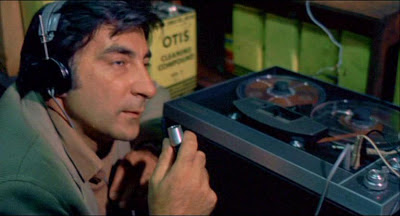Monday, June 24, 2013
Someone is listening, someone is watching: The Anderson Tapes
The recent flap over government surveillance via Internet and cell phone interception by the NSA, should be nothing new to anyone who has lived in this country during the second half of the twentieth century. Someone watching us on camera or even listening to us via various devices has been going on a long time.
I read the novel, The Anderson Tapes by Lawrence Sanders when it was published in 1970, and saw the movie version the next year. To tell the story of a major burglary the novel is constructed as a string of various recorded transcripts made by the government: the IRS, district attorney, and even a private detective,. It would have been difficult to make a movie using that format, so the film is told in a more traditional fashion, with interjections to show that ex-con Duke Anderson (Sean Connery), is caught on audio tape and surreptitious filming as he goes about his business of arranging a heist.
Watching the movie again a couple of days ago I was struck by how modern it seems in its storytelling and location photography, but with scenes of outdated technology. It was 41 years ago, and while technology has gotten more sophisticated, the ideas have remained the same. They record people saying and doing things that will incriminate them in order to prosecute them.
The big leap forward in today's technology is the ability to track cell phones via cell phone towers, and cameras that are so small that they can be hidden virtually anywhere. It doesn’t hurt to have easy access to e-mail, where lots of people say lots of stupid things.
There has never been a technology developed that someone, somehow, can’t figure how to turn to their own advantage; especially governments and law enforcement. We often say that “Big Brother is watching,” after the famous paranoid novel, 1984 by George Orwell (“Orwellian” having entered the language, meaning that sort of constant surveillance), but how much is Big Brother, and how much might be called Little Brother, where private businesses do the work of government? They watch us in places of business, and provide a record of what we were doing (sticking up the place, for instance) to the police.
Being watched is nothing new. Privacy concerns aside, the technology is here, it’s being used, and used against us. And there doesn’t seem to be one damn thing we can do about it.
All of that being said, so Postino, you ask, how did you like the movie?
Well, I loved the movie. It’s directed by Sidney Lumet, one of my favorite directors. It has Sean Connery, stepping away from his James Bond persona.
Christopher Walken, in his movie debut, is “the kid.”
There’s a tantalizing glimpse of Dyan Cannon’s superhot hardbody.
Martin Balsam, the great character actor, is a very gay interior decorator who helps with the heist.
There are other actors like Alan King (a comedian playing out-of-type as a Mafia boss) Dick Williams and Ralph Meeker. There is even a juicy part as a cop by Garrett Morris, in his pre-Saturday Night Live days.
The movie is tight, fast-moving, intricate, interesting and exciting.
It’s also, with the use of the surveillance devices, paranoid. I don’t remember how much that affected me when I saw it during its theatrical release. I may have thought, “Oh well, they’re all criminals. That couldn’t happen to me.” Four decades later I’m not so sure of that, anymore. We may have gotten more used to the idea that when we walk out of the house to do our daily business we could be watched. Maybe most folks just don’t care.
But I do. There are a lot of things I say in private conversation or on a telephone I wouldn’t want to be made part of a database on me, a file on my private thoughts or even idle chat. What are the chances of a collection like that being made on me? None, I hope.
Subscribe to:
Post Comments (Atom)










2 comments:
"Watching the movie again a couple of days ago I was struck by how modern it seems in its storytelling and location photography, but with scenes of outdated technology."
I notice that quite often about movies made in the 1970s, almost as if they're movies made today ABOUT the 1970s.
I don't believe I've ever seen THE ANDERSON TAPES, but I'm going to have to put it on my to-watch list.
Kirk, maybe it's because a lot of the techniques of filmmaking they use today were pioneered in the sixties and seventies. Some of the greatest movies of the seventies were made on location, with none (or very little) filming in studio soundstages.
Lumet has always been a great director, but I had forgotten he made The Anderson Tapes. I'd be interested in hearing from you about what you think if you watch the movie.
Post a Comment